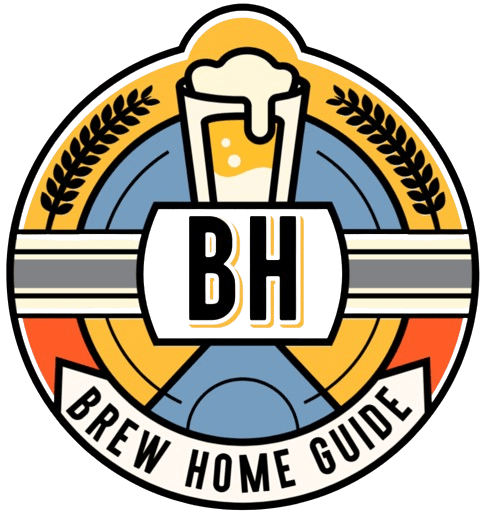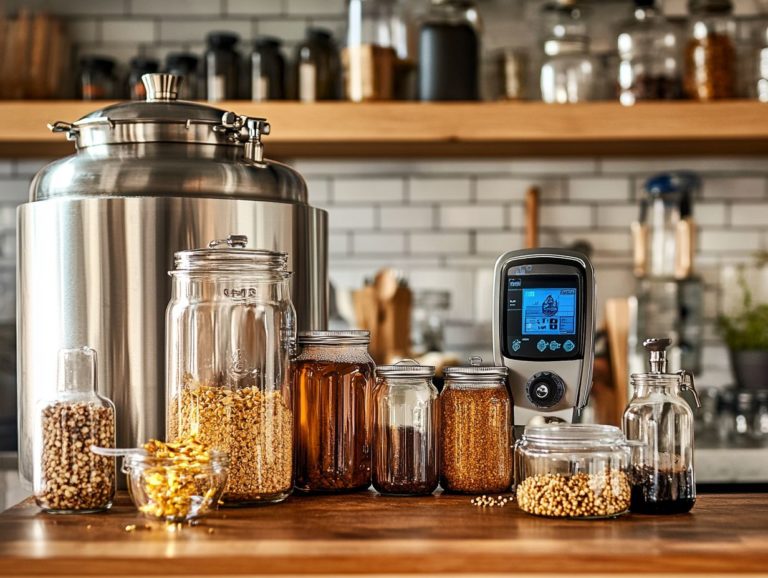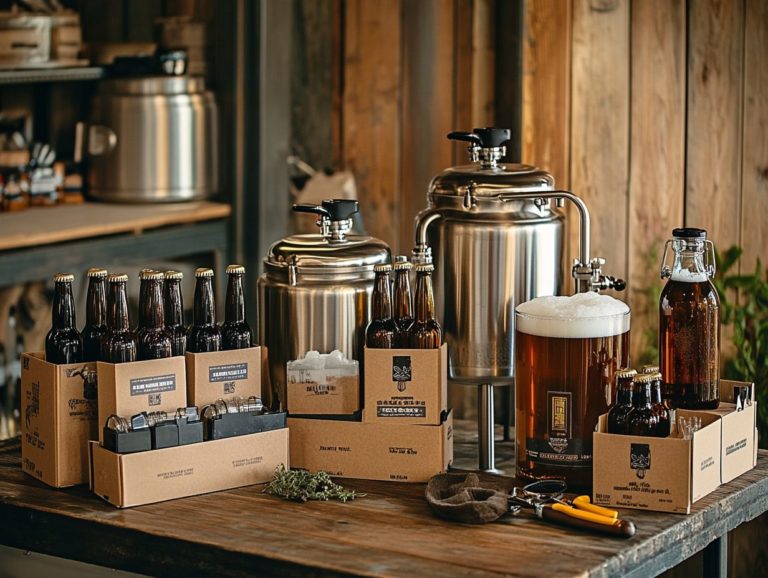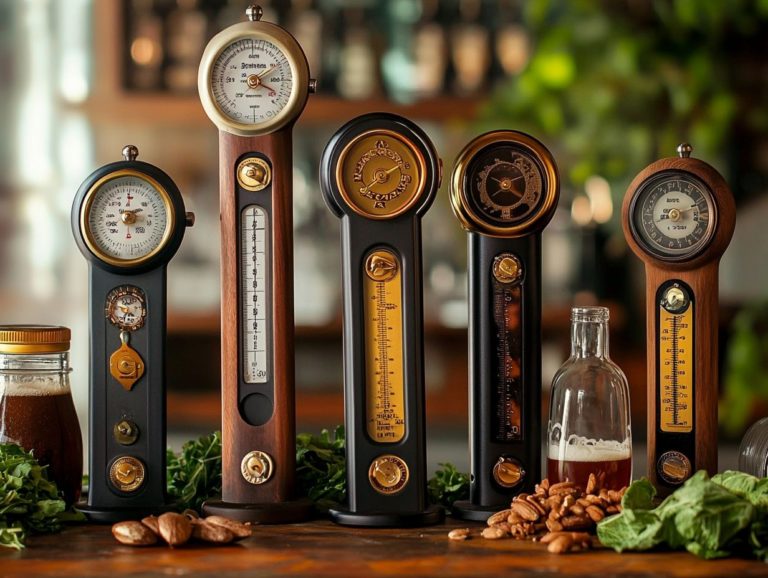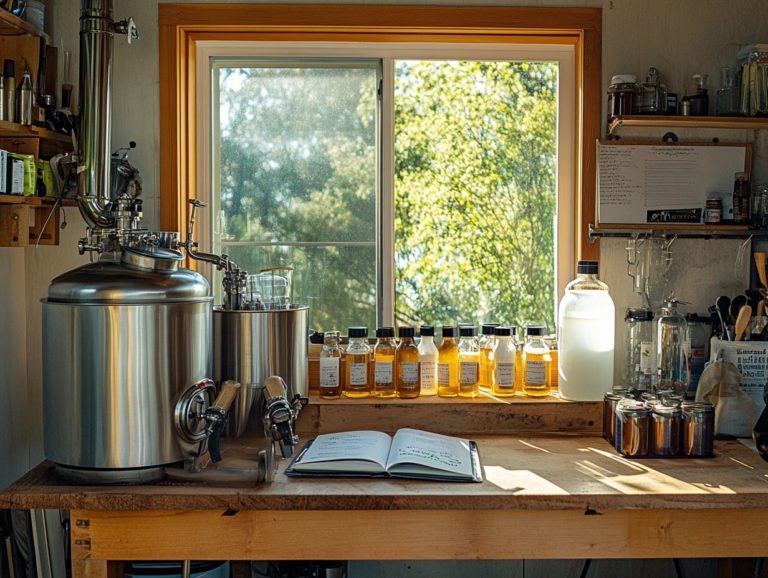5 Must-Have Books on Home Brewing Equipment
Whether you re a novice excited to brew your first batch of homebrew or a seasoned brewer aiming to elevate your craft, having the right homebrewing resources at your fingertips is crucial.
This article presents five essential brewing books that will navigate you through the nuances of home brewing equipment and techniques. You will uncover practical advice on selecting the ideal gear, steering clear of common mistakes, and honing your brewing skills through various brewing styles.
Immerse yourself in the world of home brewing and unleash your potential with the invaluable insights these brewing books provide, enhancing your understanding of the brewing process!
Contents
- Key Takeaways:
- 1. “How to Brew” by John Palmer
- 2. “The Complete Joy of Homebrewing” by Charlie Papazian
- 3. “Brewing Classic Styles” by Jamil Zainasheff and John Palmer
- 4. “Designing Great Beers” by Ray Daniels
- 5. “The Homebrewer’s Companion” by Charlie Papazian
- What Basic Equipment Is Needed for Home Brewing?
- What Are the Benefits of Home Brewing?
- How Can One Choose the Right Home Brewing Equipment?
- What Are the Common Mistakes to Avoid in Home Brewing?
- How Can One Improve Their Home Brewing Skills?
- What Are Some Advanced Home Brewing Techniques?
- Frequently Asked Questions
- What are the top 5 must-have books on home brewing equipment?
- What makes these books essential for home brewers?
- Can these books be used for any type of home brewing equipment?
- Do these books cater to specific levels of home brewers?
- Are these books updated with the latest home brewing equipment and techniques?
- Can these books be used as a reference guide for home brewing equipment?
Key Takeaways:

- “How to Brew” by John Palmer is a comprehensive guide that covers everything from basic equipment to advanced techniques for home brewing, making it a staple in any brewing library.
- “The Complete Joy of Homebrewing” by Charlie Papazian is a beloved classic that focuses on the joy and creativity of home brewing, essential for anyone exploring extract brewing or all-grain brewing methods.
- “Designing Great Beers” by Ray Daniels teaches readers how to create their own unique beer recipes, making it a must-have for any home brewer.
1. “How to Brew” by John Palmer
How to Brew by John Palmer is your essential guide. Whether you re just starting out or have been homebrewing for years, this book details the brewing process. It also covers recipe design and techniques to elevate your craft. Palmer expertly breaks down complex concepts into easily digestible sections, covering key areas like fermentation, water profiles, and yeast selection. It truly deserves a spot in every brewing library.
One of the many fascinating topics you ll dive into is the exploration of malt characteristics and how they influence flavor and body in your beer. Understanding these aspects will transform your brewing craft! The discussions on hop schedules are equally invaluable, providing guidance on achieving that perfect balance of bitterness and aroma.
Palmer s in-depth analysis of brewing ingredients reveals their specific roles and how they interact to create distinctive flavors knowledge that is crucial if you aspire to compete in brewing competitions. By applying Palmer’s insights, you can hone your skills, refine your techniques, and ultimately elevate your creations to not just meet but surpass the expectations of the brewing community.
2. “The Complete Joy of Homebrewing” by Charlie Papazian
Also Recommended: “Mastering Homebrew” by Randy Mosher
The Complete Joy of Homebrewing by Charlie Papazian is a timeless treasure that invites you to embark on your own homebrewing adventure. It reveals the joy and creativity that come with crafting your own beer. Papazian emphasizes the vital role of experimentation, whether you choose extract brewing or all-grain methods. He provides invaluable insights to help you navigate the brewing process with confidence, covering everything from malt characteristics to hop schedules.
His engaging writing style makes this book essential for both novices and seasoned brewers eager to refine their craft and participate in brewing competitions.
Through his insightful approach, Papazian encourages you to embrace your creativity in recipe design and ingredient selection, fostering an environment where innovation can truly thrive. This philosophy inspires personal exploration and strengthens bonds within the craft brewing community. You will feel empowered to share your unique brews and learn from fellow enthusiasts, including members of the American Homebrewers Association.
By highlighting the importance of collaboration and shared experiences, his work has made a lasting impact on brewing history. It nurtures a sense of camaraderie among beer makers and encourages participation in events like the National Homebrew Competition, fostering a community that continues to flourish today.
3. “Brewing Classic Styles” by Jamil Zainasheff and John Palmer
“Brewing Classic Styles” by Jamil Zainasheff and John Palmer is your authoritative guide, clearly explaining the recipes and techniques essential for crafting some of the world’s most esteemed beer styles. It’s a must-have for any brewing library.
The authors break down each brewing style, examining recipes component by component. This approach allows you to easily grasp the complexities of ingredients like specialty malts malts with unique flavors and various hop types, making it invaluable for both homebrewers and aspiring brewmasters.
By sharing their extensive knowledge, the book highlights the technical aspects of brewing while celebrating the art of recipe design. You’ll be amazed at how small changes can completely transform your beer’s flavor and aromas, making it essential reading for anyone serious about brewing competitions.
This book is a game-changer for anyone wanting to become a better brewer! It offers insights that can elevate a novice into a skilled brewmaster and equips you with the tools necessary to shine in competitions like the National Homebrew Competition.
4. “Designing Great Beers” by Ray Daniels

Designing Great Beers by Ray Daniels offers a profound exploration into the art and science of recipe design. This book equips you with essential tools and knowledge to craft exceptional beers.
Daniels emphasizes the importance of understanding brewing ingredients, from malt characteristics to hop schedules. He guides you through a systematic approach to create unique recipes, making this book both valuable and a catalyst for experimentation and innovation.
Going beyond basic ingredients, he discusses complex topics like water profiles and yeast selection. You’ll gain critical insights into how these elements affect your beer’s flavor and aroma.
The structured guidance in this book is beneficial for a homebrewer eager to refine their skills or a competitive brewer aiming to create award-winning beers. This versatility empowers you to approach your brewing journey with confidence and creativity.
You ll find references to works by authors like Scott Janish and Gordon Strong, offering further resources for mastering your craft.
5. “The Homebrewer’s Companion” by Charlie Papazian
Stay tuned for more insights!
Also Recommended: “Water” by John Palmer and Colin Kaminski
“The Homebrewer’s Companion” by Charlie Papazian is your critical guide, perfectly complementing his earlier works. It offers additional insights into the homebrewing journey, packed with practical tips on brewing processes, brewing techniques, and fermentation techniques.
Papazian s extensive experience shines through as he walks you through everything, from selecting the right brewing ingredients to managing the fermentation process for the best possible results. This book is a comprehensive resource for beginners and provides seasoned brewers with valuable updates and fresh ideas to elevate your homebrew experience. It is an essential part of any brewing library.
The book fosters a sense of community among homebrewers, encouraging you to share your brewing adventures and challenges with others. With expert troubleshooting tips at your fingertips, you gain the confidence to tackle common issues that might arise during the brewing process. This ensures a smoother path to mastering craft brewing and achieving success in brewing competitions.
Papazian’s friendly and approachable writing style invites collaboration and dialogue. This makes it essential reading for anyone eager to connect with fellow brewing enthusiasts, including those in the American Homebrewers Association. By bridging the gap between novice and expert, this guide strengthens the vibrant culture surrounding home fermentation, ultimately inspiring creativity and innovation in crafting unique brews.
What Basic Equipment Is Needed for Home Brewing?
Understanding the essential equipment for home brewing is crucial for anyone ready to embark on this rewarding journey. The right tools can significantly enhance both the brewing process and the quality of your final product. Key pieces of equipment include fermentation containers, brew kettles, and an array of measuring tools. These are critical for successful homebrewing, whether you focus on extract brewing or all-grain brewing.
As you put together your homebrewing kit, consider how each item contributes to different brewing techniques and the overall fermentation process, including aspects like water profiles and yeast selection.
If you re leaning toward extract brewing, a smaller set of equipment will suffice think pot, stirring spoon, and fermentation bucket. If you’re ready to dive into all-grain brewing, prepare to expand your toolkit with essentials like a mash tun (a vessel used to mix grains with water during brewing) and a grain mill. Each method has unique benefits and requires specific tools.
Every brewing method demands specific equipment adjustments, which can significantly influence the efficiency and flavors that develop during fermentation. Understanding malt characteristics and hop schedules is also essential.
No matter which method you choose, impeccable sanitation is non-negotiable. Keeping your equipment clean and well-maintained is vital to prevent unwanted bacteria from ruining your brew. This ultimately ensures a more satisfying homebrew experience and better results in brewing competitions.
Don’t wait dive into this rewarding journey today!
What Are the Benefits of Home Brewing?
Home brewing offers a wealth of benefits that extend far beyond the simple joy of crafting your own beer. It cultivates a profound appreciation for the art of brewing and provides insights into its rich history. Engaging in this captivating hobby allows you to experiment with a diverse array of ingredients, styles, and techniques, ultimately crafting a beer experience that is uniquely yours.
Home brewing fosters a vibrant community among enthusiasts, encouraging the sharing of knowledge and collaboration through platforms such as the American Homebrewers Association and the Brewing Elements Series. As you embark on this journey, you can unleash your creativity to develop distinctive flavors that reflect your personal preferences or the seasonal ingredients at hand, transforming brewing into both an art and a science.
The deeper you delve into the brewing process, the more you uncover valuable insights into the chemistry of fermentation and the significance of each ingredient, enhancing your overall appreciation for this craft. Connecting with local home brewers opens up a world of opportunities, including competitions and events where you can showcase your skills and knowledge.
This not only fosters friendships and camaraderie but also contributes to a culture that celebrates local craftsmanship. Home brewing is a thrilling blend of creativity, fun, and bonding with fellow enthusiasts!
How Can One Choose the Right Home Brewing Equipment?

Choosing the right home brewing equipment is essential for ensuring a seamless brewing process, directly influencing both the quality of your beer and the ease of fermentation. As you select your equipment, take into account factors like the brewing techniques you intend to employ, the styles of beer you aspire to create, and your available space and budget.
Investing in high-quality tools that align with your brewing needs can significantly elevate your overall home brewing experience. Each category of brewing equipment serves a distinct purpose, ranging from must-have items such as fermentation containers, kettles, and hydrometers to optional upgrades like temperature controllers and kegging systems.
For example, if you re venturing into all-grain brewing, a quality kettle is critical, while a simple airlock may suffice for beginners crafting extract beers. Finding the right balance between quality and budget is crucial. Consider starting with the essentials and gradually upgrading as your skills improve. This approach helps maximize your brewing results without overspending.
What Are the Common Mistakes to Avoid in Home Brewing?
While home brewing can be rewarding, it s essential to be aware of common pitfalls. Many aspiring home brewers encounter mistakes that can easily derail their brewing process, leading to disappointing results and, let’s be honest, a fair bit of frustration. These pitfalls often stem from inadequate sanitation, improper fermentation temperatures, and misjudging ingredient quantities.
Neglecting sanitation invites unwanted bacteria and spoilage, ruining an otherwise promising batch. To mitigate this risk, it s imperative to clean and sanitize all your equipment meticulously before and after each use. Fluctuations in fermentation temperatures can stress your yeast, leading to off-flavors or even stalled fermentation. Maintaining stable conditions is essential; investing in a temperature control system can make all the difference.
Lastly, measuring your ingredients with precision is key to achieving a balanced brew. A simple kitchen scale can help you avoid the pitfalls of overly bitter or weak beers. By honing in on these critical aspects, you ll not only refine your craft but also enjoy consistent success in your brewing endeavors.
How Can One Improve Their Home Brewing Skills?
Improving your home brewing skills requires a blend of practice, education, and experimentation. Each element plays a crucial role in mastering the art of brewing.
Dive into brewing books, attend workshops, and immerse yourself in home brewing communities to significantly enhance your understanding of recipes and techniques.
Regularly experimenting with different ingredients and processes allows you to refine your skills and craft unique flavors in your homebrew.
Joining a local brewing club can help you connect with fellow enthusiasts and share insights. You can also gain hands-on experience through collaborative projects.
Participating in competitions offers invaluable feedback from seasoned judges, helping you pinpoint areas for improvement while cultivating a competitive yet supportive learning environment.
Educating yourself about the rich history of brewing and exploring various styles such as lagers, ales, and sour beers can provide fresh perspectives and ignite your creativity.
Embracing these opportunities for continuous learning will lead to greater mastery and satisfaction in your brewing journey.
What Are Some Advanced Home Brewing Techniques?
Advanced home brewing techniques present you with the perfect opportunity to innovate and elevate your craft. This includes methods like precise yeast selection and fine-tuning water profiles to enhance flavor.
Embracing these techniques demands a deeper understanding of the brewing process. It also requires a willingness to experiment with recipe design and ingredient selection.
By honing these advanced skills, you can create unique and high-quality beers that truly stand out, whether in your home brewing endeavors or in competitive settings.
Diving into specific methods, such as dry hopping (adding hops during fermentation), can significantly enhance the aroma and bitterness of your brews. Meanwhile, barrel aging introduces complex flavors that elevate a standard beer to something extraordinary.
Blending different beer styles opens the door to creative combinations that will tantalize the palate and expand your brewing repertoire.
It’s crucial for you to carefully write down each experiment and analyze the outcomes. This practice ensures that you gain a comprehensive understanding of what works and what doesn t.
Such a framework not only helps refine your existing recipes but also fosters innovation, encouraging you to push boundaries and pursue your passion for crafting distinctive brews.
Frequently Asked Questions
What are the top 5 must-have books on home brewing equipment?

The top 5 must-have books on home brewing equipment are “The Complete Joy of Homebrewing” by Charlie Papazian, “How to Brew” by John J. Palmer, “Designing Great Beers” by Ray Daniels, “The Homebrewer’s Companion” by Charlie Papazian, and “The Complete Homebrew Beer Book” by George Hummel.
What makes these books essential for home brewers?
These books are essential because they cover all aspects of home brewing equipment, from beginner basics to advanced techniques. They provide valuable information on ingredients, recipes, and troubleshooting common issues.
Can these books be used for any type of home brewing equipment?
Yes, these books can be used for any type of home brewing equipment, whether you have a simple brewing setup or a more complex one. They offer a wide range of information that can be applied to different brewing methods and equipment.
Do these books cater to specific levels of home brewers?
These books cater to all levels of home brewers, from beginners to experienced brewers. They provide a wealth of knowledge for those just starting out and offer advanced techniques and tips for those looking to improve their brewing skills.
Are these books updated with the latest home brewing equipment and techniques?
Yes, these books are regularly updated with the latest home brewing equipment and techniques. The authors are experienced brewers who continue to stay updated on the industry, ensuring that the information in their books is current and relevant.
Can these books be used as a reference guide for home brewing equipment?
Absolutely, these books can be used as a reference guide for home brewing equipment. They are comprehensive and cover everything from equipment setup to troubleshooting, making them a valuable resource for any home brewer.
Join the brewing community today and share your experiences!
